2009 年天津商业大学基础英语考研真题
Part One Vocabulary & Structure
Directions: In each question, decide which of the four choices given will most
suitably complete the sentence if inserted at the place marked.
1. Small children are often___________ to nightmares after hearing ghost stories
in the dark.
a. definitive b. perceptible c. incipient d. susceptible
2. As the ________ of the situation slowly became apparent, the crowd’s mood changed
from anxiety to hysteria.
a. alleviate b. elevate c. gravity d. levity
3. Their relations during the divorce proceeding had been mostly friendly, so his
_________ in the judge’s chambers surprised her.
a. bellicose b. belligerence c. rebellion d. appease
4. the detectives insisted on a detailed and __________ account of evening’s events.
a. sequential b. consequential c. obsequious d. conductive
5. Nothing his enemies could say managed to ___________ for his heroic public image.
a. detract b. abstract c. retract d. subtract
6. Lord Raglan’s _________ order confused the commander of the light Brigade and
led to its disastrous charge.
a. ambivalent b. ambiguous c. amphibian d. ambient
7. Many astronomers think the universe is continuing to evolve from a _________ cloud
of gas.
a. polyphony b. primal c. primordial d. primogeniture
8. Sheep, cattle and antelope are __________; unlike dogs and cats, they show no
interest in meat.
a. voracious b. omnivorous c. carnivorous d. herbivorous
9. Thrillers and action movies only succeed if they do not strain our ________ too
�
much.
a. credence b. credulity c. credibility d. creed
10. Having spent the weekend going to parties, she was only able to give the chapter
a _________ reading before class on Monday.
a. concurrent b. recurrent c. cursory d. discursive
11. Vincent Van Gogh’s rise to __________ fame as one of the world’s great artists
came despite the fact that he scarcely sold a single painting during his lifetime.
a. posthumous b. postmodern c. postmortem d. posterior
12. The boys did not take the apples with any _______ intent, they were just
hungrynand did not know any better.
a. malnourished b. malefactor c. malign d. malicious
13. The whole family was _________ by nature, and there were bitter legal battles
over the will.
a. acquisitive b. inquisitive c. requisition d. perquisite
14. Her unfair opinion of him has based on several ________ assumptions.
a. errant b. aberrant c. erroneous d. erratic
15. Sometimes what has always seemed a ___________ suddenly is shown to be false.
a. verisimilitude b. verity c. verify d. phantasm
16. __________ your request for an additional assistant, I can only say at this stage
that this is being considered.
a. For the purpose of b. In regard to
c. In terms of d. In view of
17. Money sent ____________ the broadcast appeal will be used to buy blankets and
medical supplies.
a. in favor of b. in return for
in exchange for d. in response to
18. let’s say, just ____________ argument, that you have got $ 200 to invest.
a. for fear of b. for the sake of
c. in case of d. in the event of
19. It is impossible to__________ such an important topic in such limited space.
�
a. do damage to b. do good to
c. do justice to d. do wonders to
20. He took ____________ the good weather to paint the shed.
a. use of b. advantage of
c. an interest in d. part in
21. The doctor willingly went _________ his dinner if by attending a patient quickly
he could relieve his suffering.
a. along with b. over to
c. without d. up to
22. This work should have been finished yesterday, I am getting terribly _________.
a. behind b. beneath c. below d. backward
23. With so many countries trying to own nuclear bombs, a global disaster is just
_________ the corner.
a. at b. around c. in d. on
24. At the height of the financial crisis, all they could do was __________ and hope
that conditions would improve.
a. ge on b. go on c. hold on d. look on
25.The colonial government had ___________ the rights of the native people.
a. trampled on b. trodden on
c. trespassed on d. tried on
26. let’s go swimming, __________?
a. are we b. don’t we c. will we d. shall we
27. A body weights ___________ from the surface of the earth.
a. less the farther it gets b. the farther it gets, the less
c. less than it gets farther d. less than it, the father it gets
28. Essentially, a theory is an abstract, symbolic representation of _________
reality.
A. that is conceived b. that is being conceived of
c. what it is conceived d. what is conceived to be
29. After the funeral, the residents of the apartment building _________.
�
a. sent faithfully flowers all weeks to the cemetery
b. sent to the cemetery each week flowers faithfully
c. sent flowers faithfully to the cemetery each week
d. sent each week faithfully to the cemetery flowers
30. _________, allowing the passage of nerve fibers and blood vessels.
a. Whenever microscopic canals embraced by the bone
b. The bone embraced many microscopic canals
c. Microscopic canals embraced by the bone
d. Whenever the bone embraced many microscopic canals
Part Two Reading Comprehension
Directions
I. There are three reading passages in this part. Each passage is followed by some
questions or unfinished statements. For each of them there are four choices marked
[a], [b], [c] and [d]. You should decide on the best choice and then mark it on the
answer sheet.
Passage 1
Despite their many differences of temperament and of litera
ry perspective,
Emerson, Thoreau, Hawthorne, Melvill, and Whitman share certain belie
fs. Common
to all these writers is their humanistic perspective. Its
basic premises are that humans
are the spiritual center of the universe and that in them alone i
s the clue to nature,
history, and ultimately the cosmos itself. Without denying outright the existance
either of a deity or of brute matter, this perspective neverthless rejects them as
exclusive princinples of their interpretation and prefers to explain humans and the
world in terms of humanity itself. This preference is expressived most clearly in
the
�
transcendentalist principle that the structure of the individual self; therefore,
all
knowledge begins with self-knowledge.
This common perspective is almost always univeralized. Its emphasis is not
upon the individual as a particular European or American, but upon the human as
universal, freed from the accidence of times, space, birth, and talent. Thus, for
Emerson, the “American scholar” turns out to be simply “Man Thinking”; while,
for
Whitman, the “song of myself” merges imperceptibly into a song of all the “children
of Adam,” where “every atom belonging to me as good belongs to you.”
Also common to all the five writers is the belief that individual viture and
happiness depend upon self-realization, which, in turn, depends upon the harmonious
reconciliation of two universal psychological tendences: first the self-asserting
impulse of the individual to withdral, to remain uniqie and separate, and to be
responsible only to himself or herself and second, the self-transcdending impuse
of
the individual to embrace the whole world in the experience of a single moment and
to know and become one with that world. These conflicting impuses can be seen in
the demoncratic ethic. Democracy advocate individualism the preservation of the
individual’s freedom and self-expression. But the democratic self torn beween the
duty to self, which is implied by the concept of liberty, and duty to soceity, which
is
implied by the concept of liberty, and duty to soceity, whch is implied by the
concepts
of equlity and fraternity.
A thid assumption common to the five writers is that intuition and imagination
offer a surer road to truth than does abstract logic or scientific method. It is
illustrated
by their emphasis upon introspection—their belief that the clue to external nature
is to
�
be found in the inner world of individual pschology---and by their interpretation
of
experience as, in essence, symbolic. Both these stresses presume an organic
relationship between the self and the cosmos of which only intuition and imagination
can properly take account. These writer’s faith in the imagination and in themselves
as practioners of imagination led them to conceive of the writer as a seer and enabled
them to achieve supreme confidence in their moral and metaphysical insights.
31. The ahthor’s discussion of Emerson, Thoreau, Hawthorne, Melvill, and Whit
man
is primarily concerned with explaining ___________.
a. some of their beliefs about the difficulties invovled in self-realization.
b. some of their belefs concerning the world and place that humani
ty occupies in the
universal order.
c. some of their belefs concerning therelationship between humanism and
demoncracy.
d. the way some of their beliefs are shaped by differences in temperament and literary
outlook.
32. The author quotes Whitman primarily in oder to ________.
a. show that the poet does not agree with Emerson
b. indicate the way the poet uses the humanist ideal to praise himself.
c. suggest that the poet adapts the basic premises of humanism to his own individual
outlook on the world
d. illustrates a way the poet expresses the relationship of the individual to the
humanistic universe
33. According to the passage, the five writers object to the scientific method
primarily
because they think it __________.
a. is not the best way to obtain an understanding of the relationship beteen the
individual and cosmos
�
b. is so specialized that it leads to an understanding of separate parts of the
universe
but not of the relationship among those parts
c. cannot provide an adequate explanation of intuition and imagination
d. prevents people from recognizing the symbolic nature of experience
34. It can be infered that intuition is important to the five writers primarily
because it
provides them with _________.
a. information useful for understanding abstract logic and scientific method
b. the discipline needed in the search for truth
c. inspiration for their best writing
d. clues to the interpretation of symbolic experience
35. It can be inferred that the idea of “an organic relationship between the self
and the
cosmos” is necessary to the thinking of the five writers because such a relationship
_______.
a. enables them to assert the importance of the democratic ethic
b. justifies their concept of the freedom of the individual
c. sustains their faith in the existance of a individual
d. is the foundation of their humanistic view of existance
Passage 2
There is a new type of small advertisement becoming increa
singly common in
newspaper classified columns.It is sometimes placed among “situations vacent”,
although it does not offer anyone a job, and sometimes it appears among “situations
wanted”, although it is not placed by someone looking for a job either. What it
does is
to offer help in applying for a job.”
“Contest us bofore wtiting your application”, or “make use of our lone xperience
�
in preparing your curriculum vitae or job history”, is how it is usually expressed.
The
grownth and apparent success of such a apecialized service is, of course, a
reflectionon the current high levels of unemployment. It is also an indication on
the
growing importance of the curriculum vitae (or job history), with the suggestion
that
it now qualify as an art form in its own right.There was a time when job seekers
simply wrote letters of application, “Just put down your name, address, age and
whether you have passed any exams”, was about the average level of advice offered
to young people applying for their first jobs when I left school. The letter was
really
just for openers, it was explained, everything eles could and should be saved for
the
interview. And in those days of full employment the technique worked. The letter
proved that you coule writen and available for work. Your eager face and intellegent
replies did the rest.
Later, as you move up the ladder, something slightly more sophisticated was
called for. The advice then was to put something in the letter which which would
distinguish you form the rest. It might be the aggressive approach. “Your search
is
over. I am the person you are looking for” was widely used trick that occasionally
succeeded. Or it might be some special feature especially designed for the job
interview. There is, however, that it is the increasing number of engaging staff
that
has led to the greater importance of the curriculum vitae.
36. The new type of advertisement which is appearing in newspaper columns
________.
a. informs job hunter of the opptunities available
b. promises useful advice to those looking for employment
�
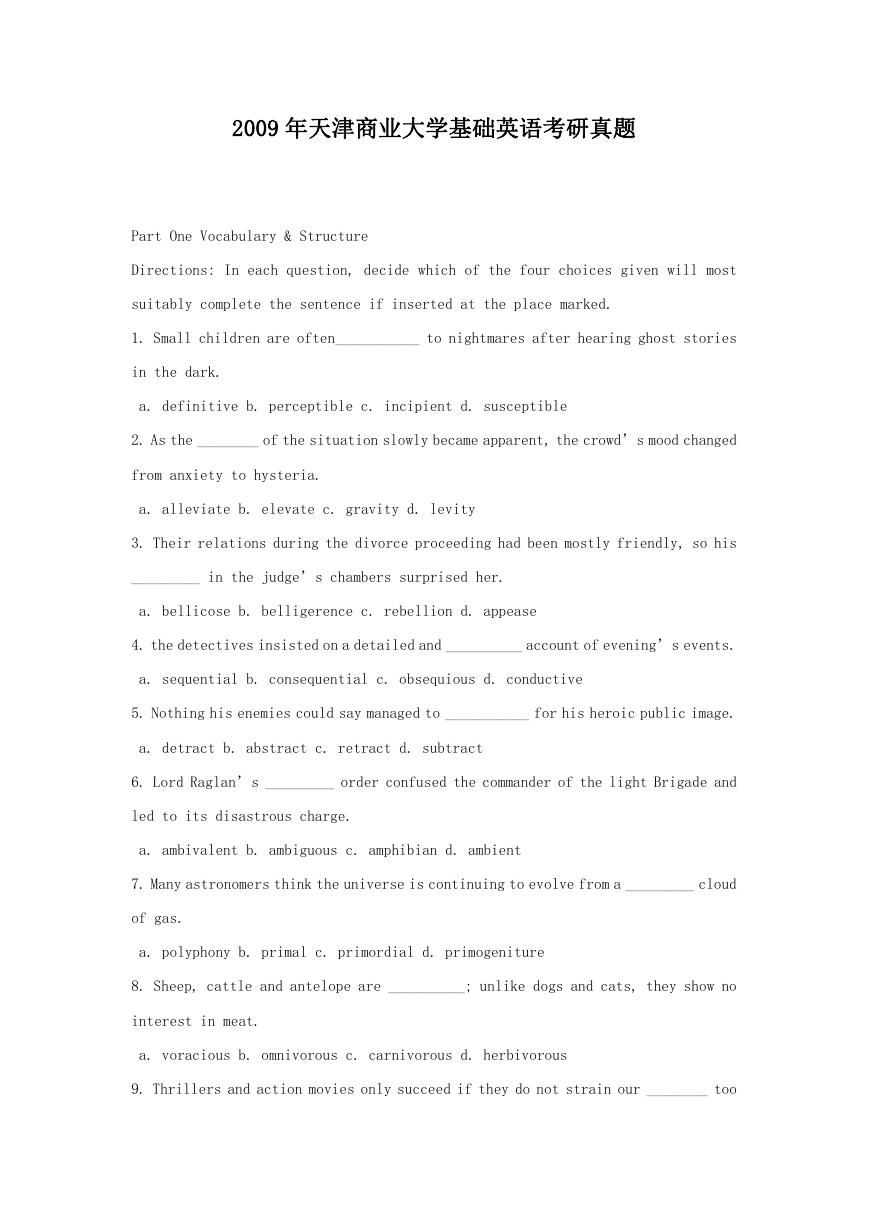
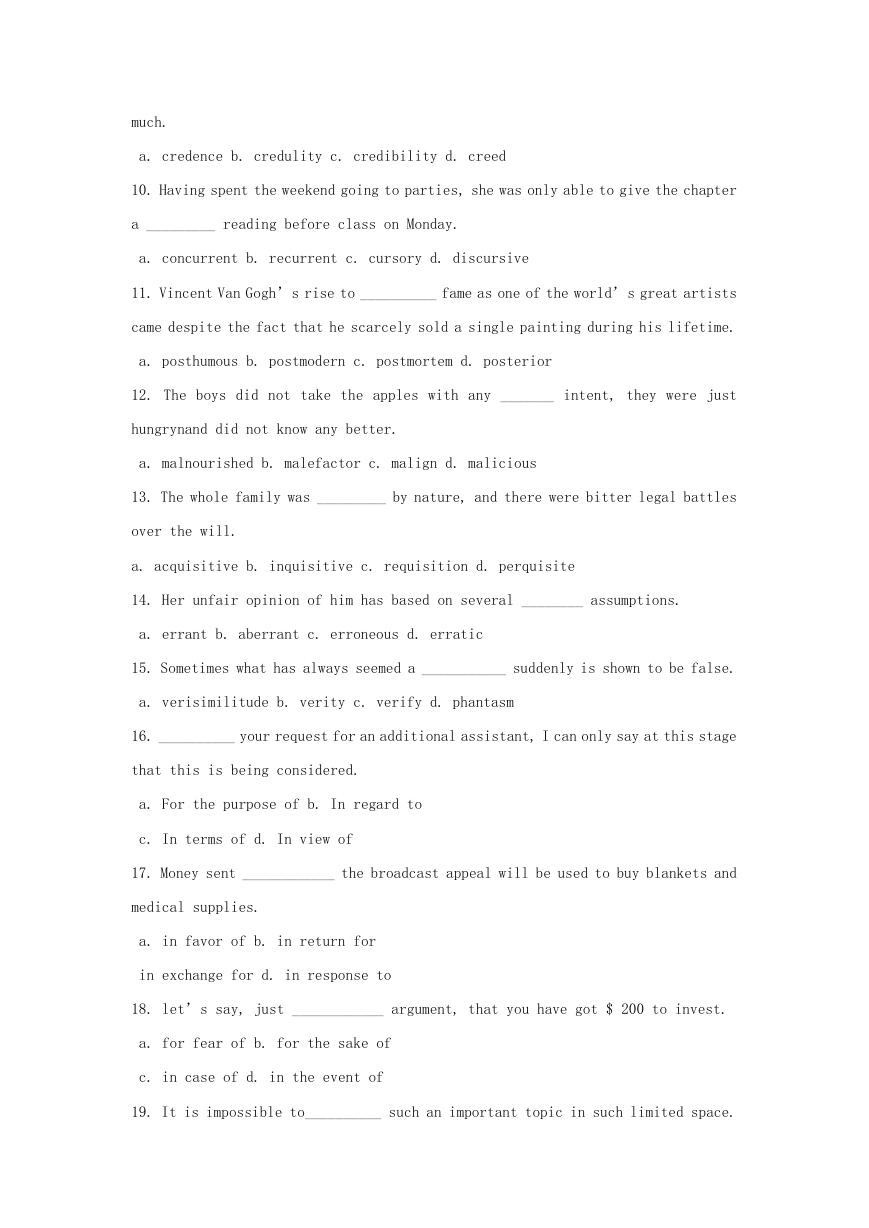
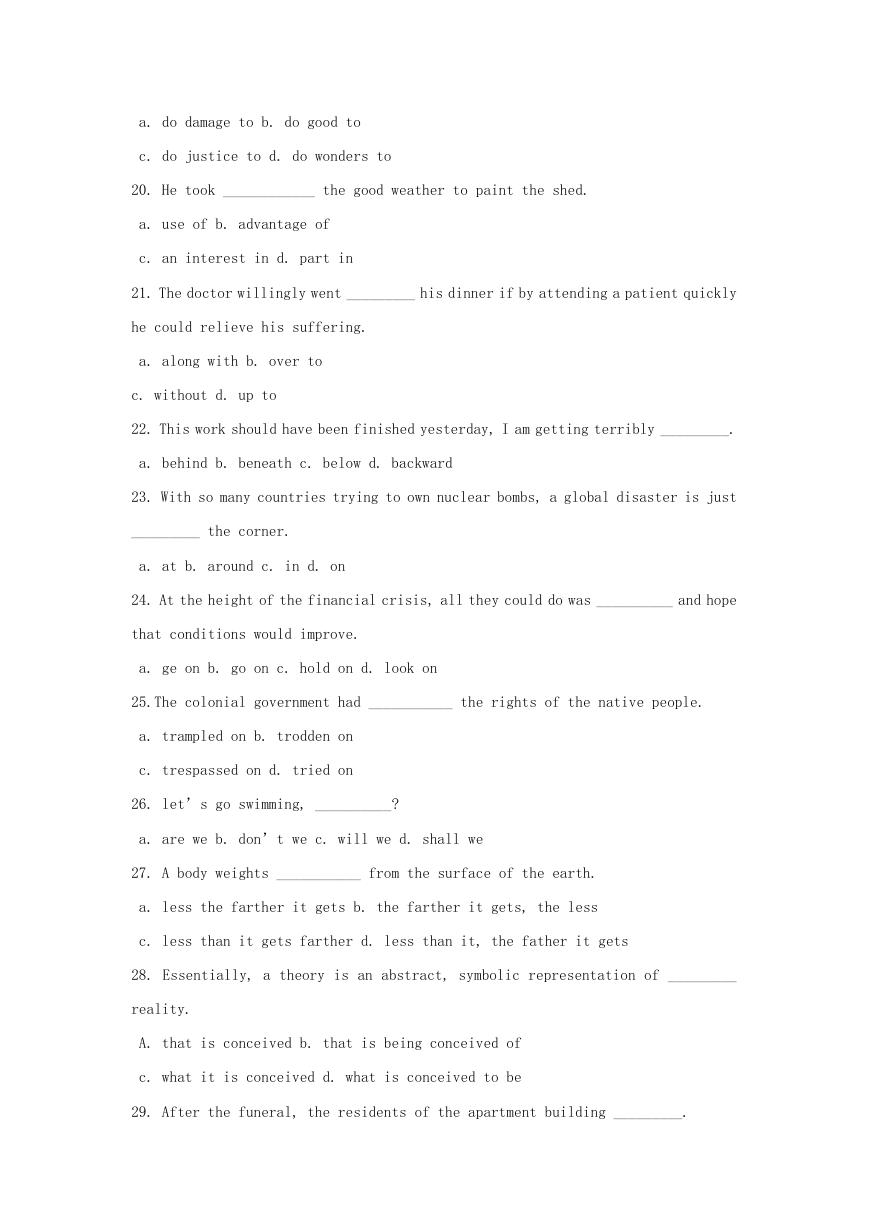
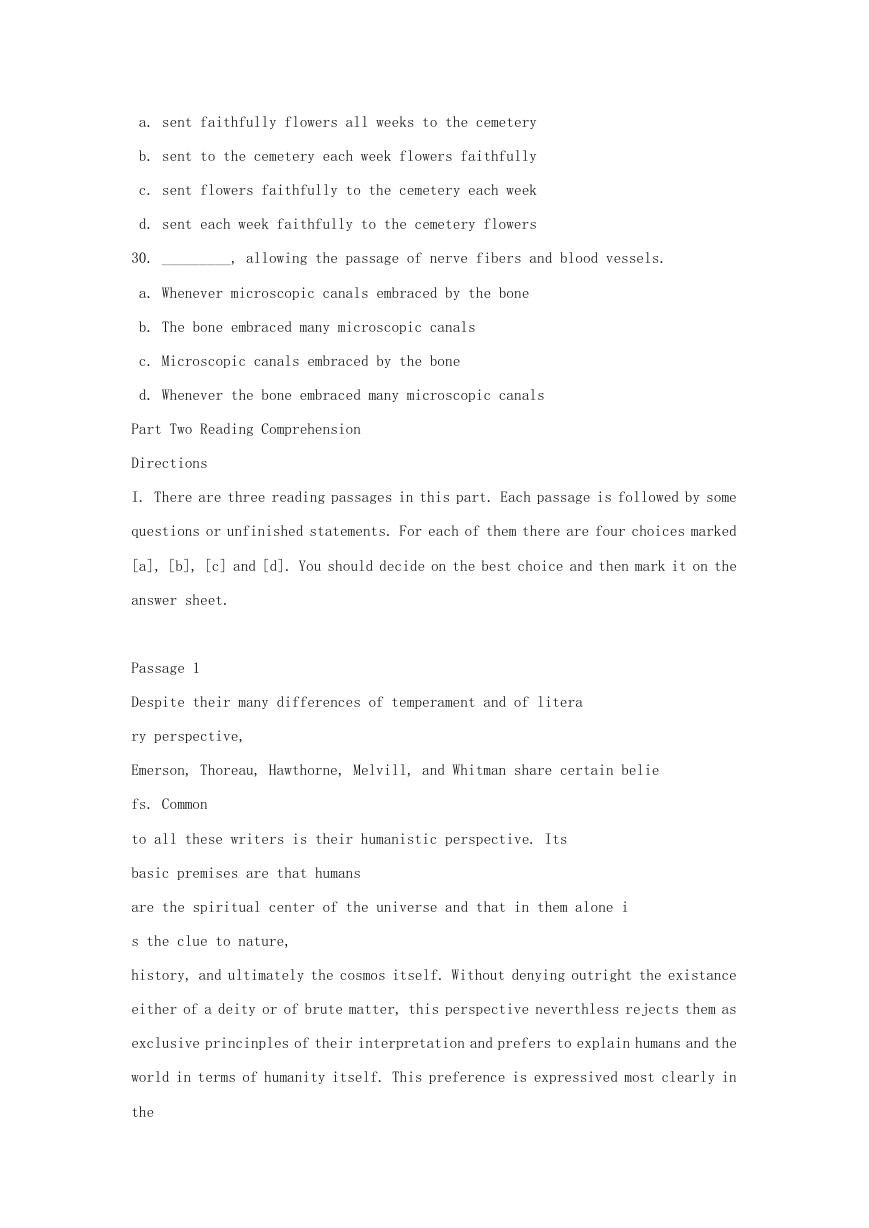
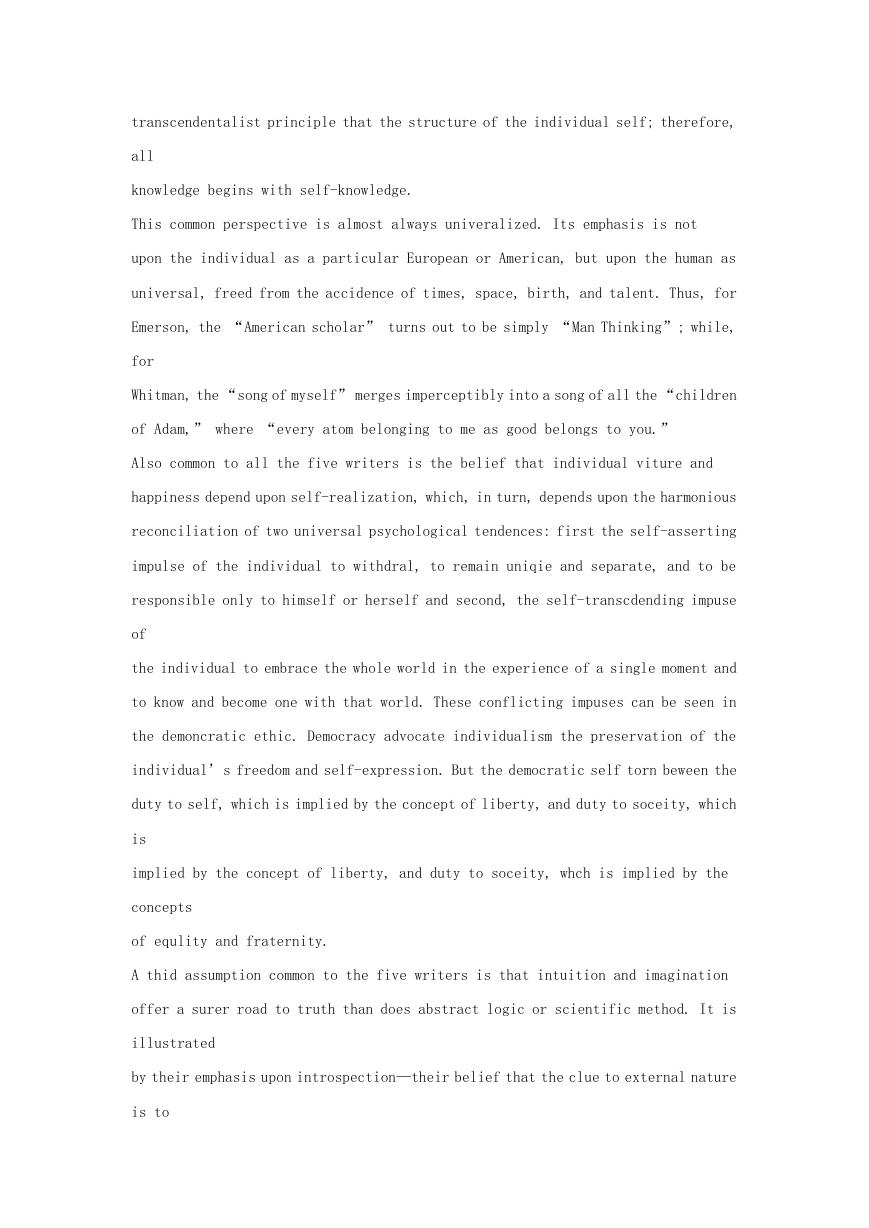
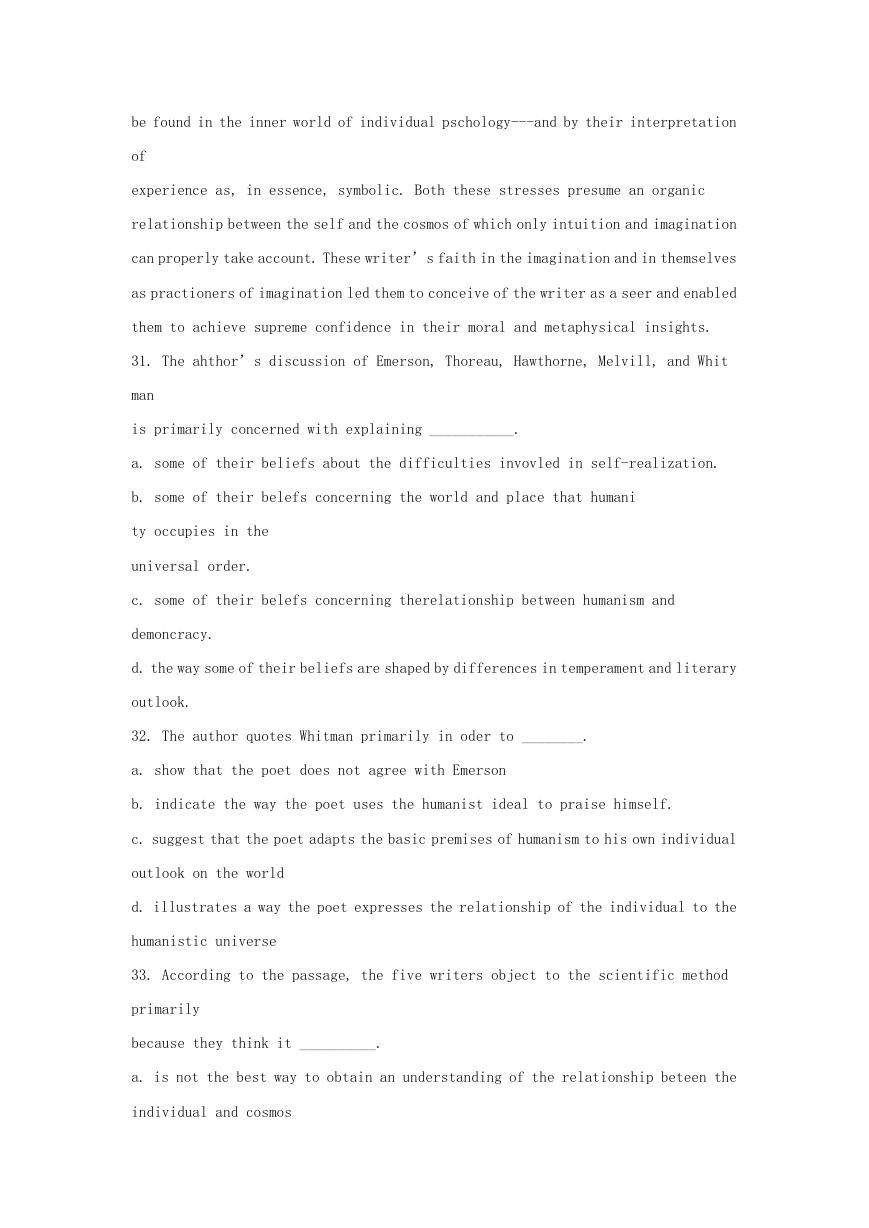
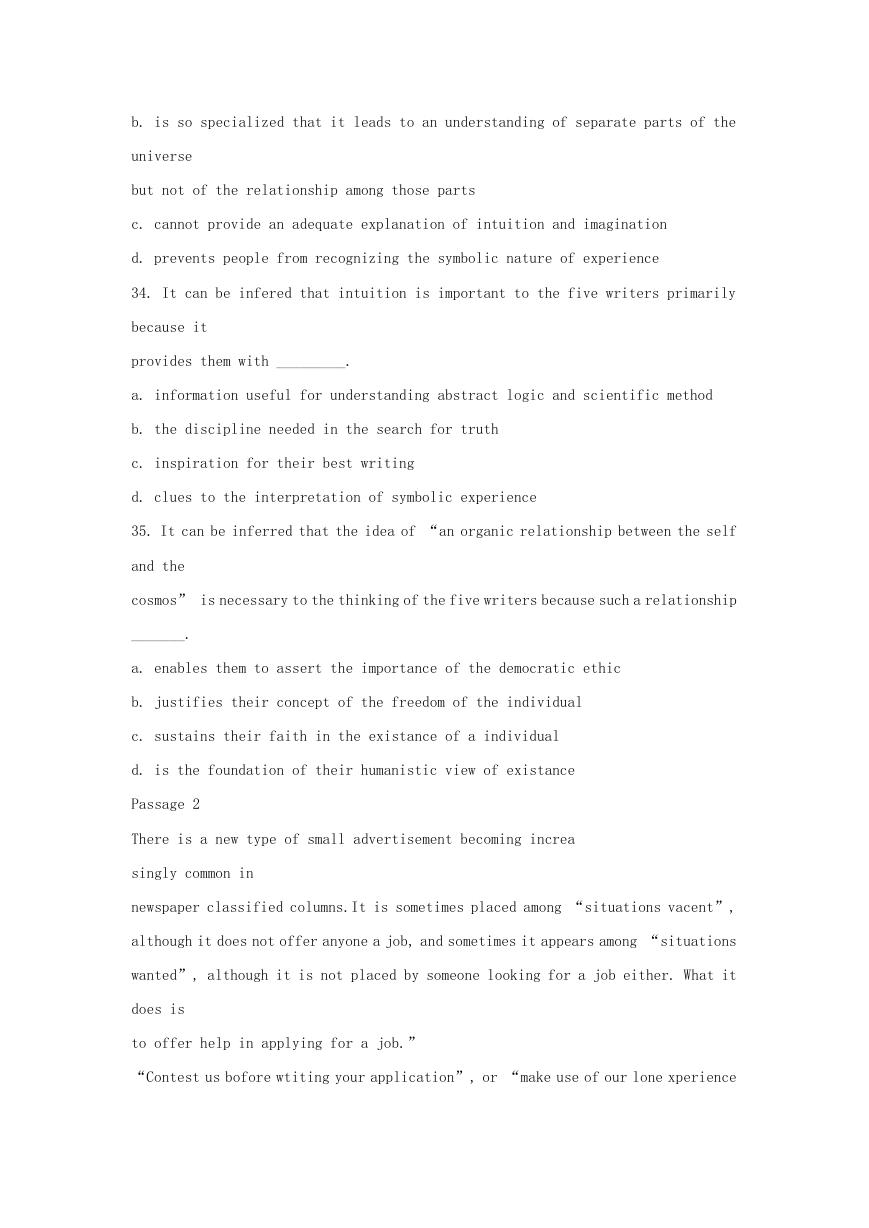
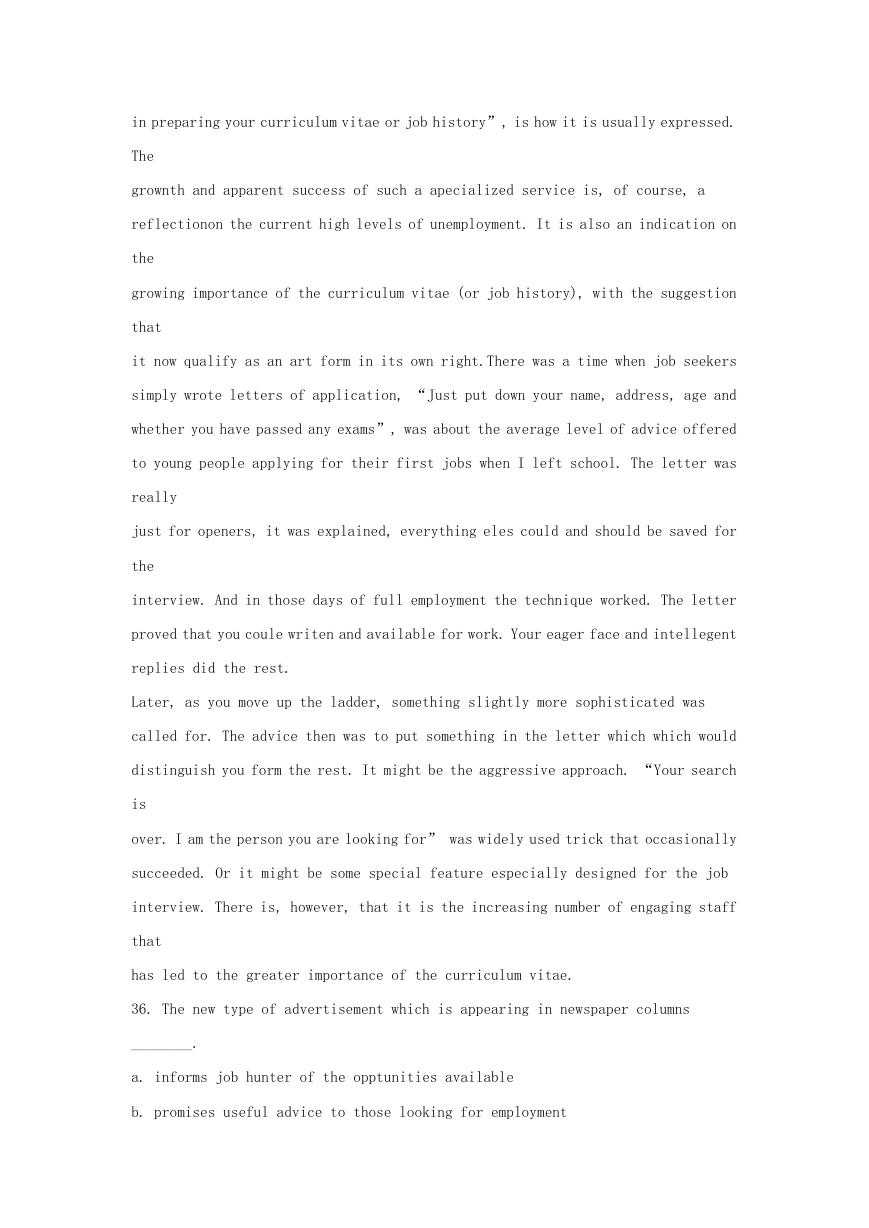








 2023年江西萍乡中考道德与法治真题及答案.doc
2023年江西萍乡中考道德与法治真题及答案.doc 2012年重庆南川中考生物真题及答案.doc
2012年重庆南川中考生物真题及答案.doc 2013年江西师范大学地理学综合及文艺理论基础考研真题.doc
2013年江西师范大学地理学综合及文艺理论基础考研真题.doc 2020年四川甘孜小升初语文真题及答案I卷.doc
2020年四川甘孜小升初语文真题及答案I卷.doc 2020年注册岩土工程师专业基础考试真题及答案.doc
2020年注册岩土工程师专业基础考试真题及答案.doc 2023-2024学年福建省厦门市九年级上学期数学月考试题及答案.doc
2023-2024学年福建省厦门市九年级上学期数学月考试题及答案.doc 2021-2022学年辽宁省沈阳市大东区九年级上学期语文期末试题及答案.doc
2021-2022学年辽宁省沈阳市大东区九年级上学期语文期末试题及答案.doc 2022-2023学年北京东城区初三第一学期物理期末试卷及答案.doc
2022-2023学年北京东城区初三第一学期物理期末试卷及答案.doc 2018上半年江西教师资格初中地理学科知识与教学能力真题及答案.doc
2018上半年江西教师资格初中地理学科知识与教学能力真题及答案.doc 2012年河北国家公务员申论考试真题及答案-省级.doc
2012年河北国家公务员申论考试真题及答案-省级.doc 2020-2021学年江苏省扬州市江都区邵樊片九年级上学期数学第一次质量检测试题及答案.doc
2020-2021学年江苏省扬州市江都区邵樊片九年级上学期数学第一次质量检测试题及答案.doc 2022下半年黑龙江教师资格证中学综合素质真题及答案.doc
2022下半年黑龙江教师资格证中学综合素质真题及答案.doc